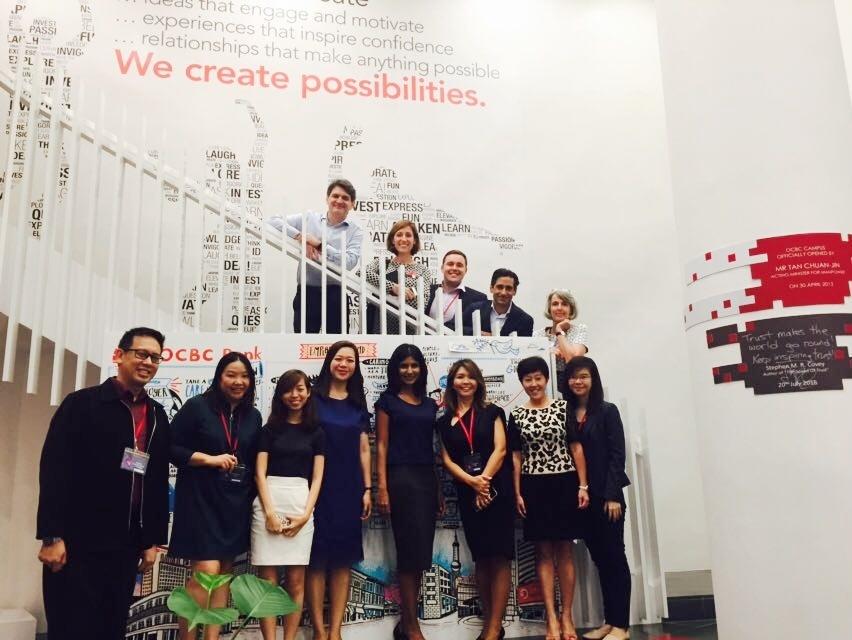How to Career Coach: 10 Key Tips for HR Leaders & Managers
Posted by Alexandra Lamb
In today's rapidly evolving workplace landscape, effective organisational development extends beyond traditional training, performance management and career planning. It encompasses empowering managers to guide and support their team members in achieving their professional aspirations, activating their motivation to strive for their personal bests. One of the most impactful strategies to achieve this activation is through career coaching.
In this blog post, we'll explore the transformative power of career coaching and its pivotal role in employee development. We'll delve into the fundamentals of career coaching, discuss key indicators that suggest a team member could benefit from coaching, distinguish between career coaching and counselling, and highlight the numerous benefits of integrating career coaching into your organisational culture. Additionally, we'll provide ten actionable tips to equip you and your managers with the tools and techniques necessary to effectively coach team members towards career success.
By embracing career coaching as an integral aspect of your approach to staff engagement, you can unlock the full potential of your workforce, foster a culture of continuous learning and development, and ultimately drive organisational success.
What is Career Coaching?
Career coaching is a collaborative process between a HR leader or manager and key talent, aimed at identifying and achieving professional goals, enhancing skills, and overcoming obstacles in their career path. It involves setting clear objectives, providing guidance, and offering support to help individuals navigate their career journey and realize their full potential.
Several academic studies and industry reports have highlighted the positive impact of career coaching on staff engagement. According to a study published in the Journal of Career Development by The International Coaching Federation (ICF) and the Human Capital Institute (HCI), employees who receive career coaching demonstrate higher levels of engagement, job satisfaction, and commitment to their organisation. These and other similar studies provide empirical evidence supporting the positive correlation between career coaching and staff engagement, highlighting the importance of incorporating coaching initiatives into organisational development strategies.
Case Study: How BOLDLY empowered HR Professionals to play a strategic role in Talent Development
Jardines, a diversified group of companies operating across various industries, recognized the need to enhance their HR capabilities to effectively support talent development and career planning initiatives. To address this challenge, Jardines partnered with BOLDLY to design and implement a comprehensive career counselling program for HR professionals across all business units.
The goal of the program was to equip HR business partners with the necessary skills, knowledge, and tools to conduct meaningful career planning discussions with high potential talent, map career pathways within strategic talent streams, and facilitate informed career decisions across the group of companies.
The program, spanning over six months, encompassed a series of workshops, training sessions, and hands-on activities tailored to the specific needs and objectives of Jardines HR professionals. BOLDLY's expert coaches guided participants through various modules covering topics such as goal setting, coaching techniques, mentorship, and training methodologies. Additionally, the program delved into advanced concepts such as assessment methods, competency modeling, and the economic and social factors influencing career decisions.

By the end of the program, HR business partners at Jardines demonstrated a significant ability to engage in effective career counselling conversations with high potential talent. They gained a deeper understanding of goal setting techniques, learned when to employ coaching, mentoring, or training approaches, and acquired proficiency in utilizing assessment tools and competency models to support career planning initiatives. Moreover, the program fostered a collaborative environment among HR professionals, enabling them to share best practices and insights across business units.
The career counselling program facilitated by BOLDLY empowered Jardines HR professionals to play a more strategic role in talent development and succession planning within the organisation. By leveraging their newfound skills and knowledge, HR business partners were able to guide employees towards meaningful career paths aligned with organisational goals, thereby enhancing employee engagement, retention, and overall organisational performance.
The successful collaboration between Jardines and BOLDLY exemplifies the transformative impact of investing in HR development initiatives tailored to meet the evolving needs of the organisation. By equipping HR professionals with the tools and expertise to effectively navigate career counselling discussions, Jardines has positioned itself as a leader in talent management and employee development within the industry.
The Career Coaching Journey
The career coaching journey typically follows a structured process designed to support individuals in clarifying their career goals, identifying obstacles, and developing action plans to achieve their objectives. While variations may occur based on individual needs and preferences, a typical journey may include the following components:
- Initial Assessment Meeting: The journey often begins with an initial assessment meeting between the coach and the coachee (individual receiving coaching). During this session, the coach gathers information about the coachee's background, career aspirations, strengths, challenges, and areas for development.
- Goal Setting: Following the assessment, the coach and coachee collaboratively establish clear and measurable goals for the coaching engagement. These goals serve as the foundation for subsequent coaching sessions and guide the overall direction of the coaching journey.
- Coaching Sessions: The coaching journey typically consists of a series of one-on-one coaching sessions conducted between the coach and coachee. These sessions provide a safe and confidential space for the coachee to explore their thoughts, feelings, and experiences related to their career aspirations and challenges. The coach in this case may be a trained HR Business Partner, a trained manager, or an external independent coach.
- Exploration and Reflection: Throughout the coaching journey, the coach helps the coachee explore their values, interests, skills, and motivations to gain clarity about their career direction. Reflection exercises, self-assessments, and goal-setting activities may be utilized to facilitate this process.
- Action Planning: Based on insights gained through exploration and reflection, the coachee and coach collaborate to develop actionable steps and strategies to achieve the coachee's career goals. These action plans may include specific tasks, timelines, and accountability measures to ensure progress towards desired outcomes.
- Accountability and Support: The coach provides ongoing support and accountability to help the coachee stay focused and motivated as they work towards their goals. Regular check-ins and progress reviews are conducted to track progress, celebrate achievements, and address any obstacles or challenges that arise.
- Evaluation and Closure: At the conclusion of the coaching journey, the coachee and coach evaluate the progress made towards the established goals and reflect on the overall coaching experience. The coach may also provide feedback and recommendations for continued growth and development.
Throughout the coaching journey, various documents may be produced to support the process, including goal-setting worksheets, action plans, progress trackers, and session summaries. These documents serve as valuable tools for documenting insights, tracking progress, and facilitating communication between the coach and coachee.
In order to trigger a career coaching journey effectively, the HR leader and manager may be on the lookout for several indications that career coaching is appropriate.

Five Signs that Your Team Member Needs Career Coaching:
HR and direct line managers should consider the following indicators when determining if career coaching is a suitable approach for their staff. Career coaching should always be used proactively to engage high performing and highly motivated employees. It is not a remedial resource, or a reaction to resignation.
- Proactive Pursuit of Growth Opportunities: When a team member consistently seeks out new challenges, projects, or learning opportunities beyond their current role, it indicates a strong desire for professional development and advancement. Providing career coaching can help harness this ambition and channel it towards strategic career progression within the organisation.
- Demonstrates High Levels of Engagement: Team members who exhibit high levels of engagement, enthusiasm, and commitment to their work are prime candidates for career coaching. Investing in their development through coaching demonstrates the organisation's commitment to nurturing their talent and fostering a culture of continuous growth and improvement.
- Displays Exceptional Performance and Potential: Employees who consistently exceed performance expectations and demonstrate high potential for future leadership roles may benefit from career coaching to further accelerate their career trajectory. Coaching can help these individuals leverage their strengths, address development areas, and navigate career advancement opportunities effectively.
- Seeks Feedback and Self-Reflection: Team members who actively seek feedback, engage in self-reflection, and demonstrate a willingness to learn and grow are ideal candidates for career coaching. Coaching can provide them with valuable insights, guidance, and support to enhance their self-awareness, identify areas for improvement, and maximize their professional potential.
- Shows Long-Term Commitment to the organisation: Employees who express a strong commitment to the organisation's mission, values, and goals are valuable assets that warrant investment in their career development. Career coaching can help these individuals align their personal aspirations with the organisation's strategic objectives, fostering a sense of purpose, fulfillment, and loyalty.
By recognizing these positive indicators and proactively offering career coaching to engaged and high-performing team members, organisations can demonstrate their commitment to employee development, retention, and long-term success.
Career Coaching vs. Counselling:
While career coaching and counselling share similarities, they serve distinct purposes. Career coaching and career counselling are both valuable forms of support for individuals seeking guidance and assistance in their career development journey, but they differ in their focus, approach, and outcomes:
Focus:
- Career Coaching: Career coaching focuses on empowering individuals to identify and achieve their professional goals, maximize their potential, and navigate career transitions effectively. Coaches typically work with clients to explore their strengths, interests, values, and aspirations, develop action plans, and overcome obstacles to success.
- Career counselling : Career counselling focuses on providing individuals with guidance, support, and resources to explore career options, make informed decisions, and address career-related challenges or concerns. Counselors may help clients clarify their career interests, assess their skills and qualifications, explore educational or training opportunities, and cope with career-related stressors.
Approach:
- Career Coaching: Career coaching employs a strengths-based and action-oriented approach, emphasizing self-discovery, goal setting, and accountability. Coaches facilitate a dynamic and collaborative process that encourages clients to explore possibilities, gain clarity, and take proactive steps towards achieving their career objectives.
- Career Counselling : Career counselling typically adopts a more directive and problem-solving approach, providing clients with practical guidance, information, and strategies to address specific career-related issues or dilemmas. Counselors may use assessment tools, career exploration exercises, and counselling techniques to help clients make informed decisions and overcome obstacles.
Outcomes:
- Career Coaching: The primary outcomes of career coaching include increased self-awareness, clarity of career goals, enhanced decision-making skills, improved confidence and resilience, and tangible progress towards achieving career objectives. Coaches focus on empowering clients to take ownership of their career development and build sustainable strategies for long-term success.
- Career Counselling: The primary outcomes of career counselling include improved career decision-making, enhanced career exploration and planning skills, increased knowledge of career options and pathways, effective coping strategies for career-related challenges, and greater satisfaction and fulfillment in one's career choices. Counselors aim to provide clients with the support and resources they need to make informed decisions and navigate their career journeys successfully.

Overall, while career coaching and career counselling share common goals of supporting individuals in their career development, they differ in their approaches and emphases, with coaching focusing more on empowerment and action, and counselling focusing more on guidance and support. Both can be valuable resources for individuals seeking to achieve their career goals and maximize their potential.
You could also go through a complete guide on What Career Coaches do.
10 Tips to Coach Your Staff or Direct Report:
Coaching is no more a luxury for a select few in an organisation but is emerging as a strategic necessity to drive growth. HR leaders and managers must include this as part of their skill repertoire. The value of coaching as a capability for supervisors is a life skill.
If you’re a HR Business Partner or Manager seeking to use career coaching to engage your staff, you should undertake training in coaching skills.
BOLDLY’s workshop on Career Counselling Skills for HR is an intense workshop on taking HR leaders and managers through key skills and nuances on how to lead career counselling skills with confidence.
Case Study 2
In collaboration with OzMinerals, BOLDLY equipped their managers with essential career counselling skills, aiming to foster a culture of meaningful career planning and engagement within the organization. Through tailored workshops and hands-on training sessions, managers gained proficiency in goal setting, coaching techniques, and mentorship approaches, enabling them to guide their direct reports through impactful career discussions. BOLDLY's partnership with OzMinerals exemplifies the impact of investing in career counselling skills as a catalyst for fostering talent development and driving organizational success.
The HR Learning Journey
In this training, you’ll learn how to do the following to a proficient level, such that your career coaching efforts will be unbiased, and deliver results in the form of engaged team members.
- Establish rapport and trust
- Listen actively and empathetically
- Clarify goals and expectations
- Provide constructive feedback
- Offer guidance and resources
- Encourage self-reflection and exploration
- Create a roadmap for success
- Set actionable objectives and milestones
- Support continuous learning and development
- Celebrate achievements and progress
By incorporating career coaching into your management culture, HR and managers can empower team members to thrive professionally, achieve their career goals, and contribute positively to the organisation's success. With training in how to use the ten key tips outlined above, you can effectively coach your team members towards a fulfilling and successful career journey.
Benefits of using an external Career Coach:
Using an external career coach who is not affiliated with the coachee's company or their direct line manager offers several benefits, including objectivity, confidentiality, expertise and accountability. Overall, engaging an external career coach offers coachees a valuable opportunity to receive objective, confidential, and expert support in navigating their career paths, achieving their professional goals, and unlocking their full potential.
Reach out to us on connect@boldly.app or go to boldly.app to find out more about BOLDLY and our offerings.
About the Author:
Alexandra Lamb is an accomplished organisational development practitioner, with experience across APAC, North America, and MENA. With 20+ years in professional practice, conglomerates, and startups, she has collaborated with rapid-growth companies and industry innovators to develop leaders and high-performance teams. She is particularly experienced in talent strategy as a driver for business growth. Drawing from her experience in the fields of talent management, psychology, coaching, product development, and human-centred design, Alex prides herself on using commercial acumen to design talent solutions with true impact.




